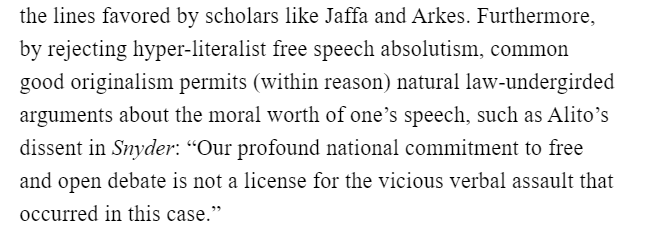Did an event with @josh_hammer earlier today at Indiana University, and, since I took the time to read and respond to his article on "Common Good Originalism," I may as well tweet out some of the thoughts I shared at the event.
Here& #39;s Josh& #39;s article. https://americanmind.org/features/waiting-for-charlemagne/common-good-originalism/">https://americanmind.org/features/...
So, first, I think it& #39;s important to start with a point of agreement:
This whole thing is keyed off by that @Vermeullarmine essay (you may remember it) arguing that conservative judges should jettison originalism in favor of the "common good." Josh rightly rejects that view.
This whole thing is keyed off by that @Vermeullarmine essay (you may remember it) arguing that conservative judges should jettison originalism in favor of the "common good." Josh rightly rejects that view.
Josh points out that judges swear an oath to uphold the constitution, which means trying to interpret and apply its words.
I& #39;d add that originalism is essential to legitimacy. If the public thinks judges are just making it up as they go along, decisions won& #39;t command respect.
I& #39;d add that originalism is essential to legitimacy. If the public thinks judges are just making it up as they go along, decisions won& #39;t command respect.
Beyond that, though, a point of disagreement:
When originalist interpretations yield two competing interpretations, both plausible, Josh suggests that judges should interpret according to their view of morality. I would counter that judges should err on the side of liberty.
When originalist interpretations yield two competing interpretations, both plausible, Josh suggests that judges should interpret according to their view of morality. I would counter that judges should err on the side of liberty.
I& #39;d say that& #39;s true, first, for a practical reason. If judges are going to apply their morality, the question is *whose* morality?
It may be tempting for conservatives to ignore that question, because they currently have a majority on the Court, but . . . (not to be morbid) . . . Justice Thomas is 72 and Justice Alito is 70. Justice Breyer is 82. In not that long, Kagan could be the swing vote.
(That& #39;s also a point I& #39;d make in response to folks on the left who are currently freaking out and arguing for court packing or the like.)
So it is easy to imagine how the kinds of "common good" arguments Josh makes could be turned against his own position.
For instance, I was struck by Josh& #39;s highlight of this line from Alito& #39;s Snyder dissent in his essay.
For instance, I was struck by Josh& #39;s highlight of this line from Alito& #39;s Snyder dissent in his essay.
Justice Alito& #39;s description of the speech in Snyder as a "verbal assault" has weird echoes with arguments used by proponents of so-called cancel culture. And it& #39;s not hard to imagine these types of arguments being turned around and used to shut down Josh& #39;s own speech.
So that& #39;s the practical objection. And beyond that, I also raise an originalist objection. If you look at the structure of enumerated powers, the First Amendment, the Ninth Amendment -- the Constitution secures liberty of the individual.
Josh cites the Preamble, pointing out that it doesn& #39;t say the purpose of government is to maximize liberty. But that& #39;s because liberty *preexists* liberty, as the Ninth Amendment makes clear.
And, in any event, the Preamble ultimately makes clear that government exists to "secure the blessings of liberty." So government institutes some restrictions on liberty, but only to the ultimate ends that liberty be preserved.
And that original scheme made sense because the country was--then as it is now--an essentially pluralist country. There were the Puritans in New England, the Dutch in NY, the Catholics in MD, and more. It would have been impossible to formulate one morality for the country.
The whole point of the constitutional scheme is that we all find our own morality. And that& #39;s what makes a country this big work.

 Read on Twitter
Read on Twitter



